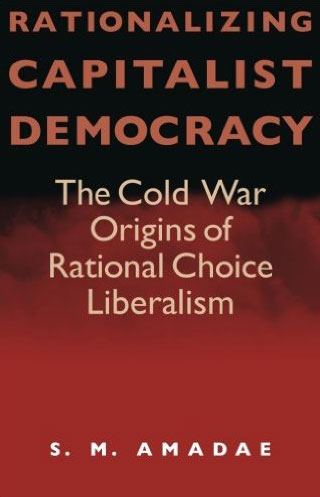 In Rationalizing Capitalist Democracy, S. M. Amadae tells the remarkable story of how rational choice theory rose from obscurity to become the intellectual bulwark of capitalist democracy. Amadae roots Rationalizing Capitalist Democracy in the turbulent post-World War II era, showing how rational choice theory grew out of the RAND Corporation's efforts to develop a "science" of military and policy decisionmaking. But while the first generation of rational choice theorists—William Riker, Kenneth Arrow, and James Buchanan—were committed to constructing a "scientific" approach to social science research, they were also deeply committed to defending American democracy from its Marxist critics. Amadae reveals not only how the ideological battles of the Cold War shaped their ideas but also how those ideas may today be undermining the very notion of individual liberty they were created to defend.
In Rationalizing Capitalist Democracy, S. M. Amadae tells the remarkable story of how rational choice theory rose from obscurity to become the intellectual bulwark of capitalist democracy. Amadae roots Rationalizing Capitalist Democracy in the turbulent post-World War II era, showing how rational choice theory grew out of the RAND Corporation's efforts to develop a "science" of military and policy decisionmaking. But while the first generation of rational choice theorists—William Riker, Kenneth Arrow, and James Buchanan—were committed to constructing a "scientific" approach to social science research, they were also deeply committed to defending American democracy from its Marxist critics. Amadae reveals not only how the ideological battles of the Cold War shaped their ideas but also how those ideas may today be undermining the very notion of individual liberty they were created to defend.Editorial Reviews
"A most interesting examination of the evolution of rational choice theory within economics, political science, and philosophy, and she describes as well how its emergence fits into the intellectual politics of the cold war era. The depth of reading and analysis is most impressive . . . Rationalizing Capitalist Democracy is an excellent work of research and a useful, engaging presentation of ideas. It will repay reading by all economists, historians, and political scientists interested in the development of ideology."
Stanley L. Engerman Business History Review
"This book should be widely consulted by anyone working in the field of social policy today. This is an engaging and important book ."
James Midgley Journal of Sociology and Social Welfare
2004 J. David Greenstone Prize
American Political Science Association
"The difficult texts in the canon of rational choice theory are discussed with clarity and insight. For those who want to know this intellectual history, this is the book to read. . . . That rational choice provided a foundation for some Cold War liberals is important and worth understanding. This book provides the means for such understanding."
Michael Coulter Journal of Markets and Morality
“[Amadae] explains how the RAND Corporation's systems analysis and rational policy analysis became normative standards in governmental decision making. There are arresting insights into the whole ensemble of defense establishment leaders and institutions. . . . This is . . . a sophisticated, substantive, and balanced interpretation. Readers will come away from this book with a nuanced and enhanced understanding of many vital and enduring themes in contemporary political thought. This is an exemplary study in modern intellectual history. It is well positioned to reconfigure the contours of the rational choice theory landscape and its legacy.”
Frank Annunziata Journal of American History
“Rational choice liberalism has become an influential part of contemporary political philosophy. Amadae brilliantly identifies the historical roots and philosophical structure of this fundamental reworking of classical liberalism and critically assesses its pivotal role in the Cold War battle versus communism.”
Robert Bellah, University of California, Berkeley
“Truly excellent, S. M. Amadae’s Rationalizing Capitalist Democracy convincingly shows how heavily the modern rise of rational choice perspectives has been shaped by the incubating role of RAND in particular and, even more fundamentally, by the Cold War context. Along the way, Amadae provides fascinating insights into the work and careers of key figures like Kenneth Arrow, Duncan Black, James Buchanan, William Riker, and John Rawls. This book makes a substantial and original contribution to modern intellectual history.”
Rogers Smith, University of Pennsylvania
“Superb. Rationalizing Capitalist Democracy is unique in its grand program and its coverage. It will be widely read by both advocates and opponents of rational choice theory. Every rational choice theorist will learn from it. Some will reinterpret what they thought they knew of parts of the theory; all will gain perspective on the massive enterprise.
Russell Hardin, Stanford University and New York University
“That which emerges from separately pursued paths of scientific inquiry often has a coherence that only an external observer can discern. As a protagonist in this book’s story line, I welcome Amadae’s integration of public choice ideas into the more comprehensive vision that was never a part of my intent.”
James Buchanan, 1986 Nobel Laureate in Economics



